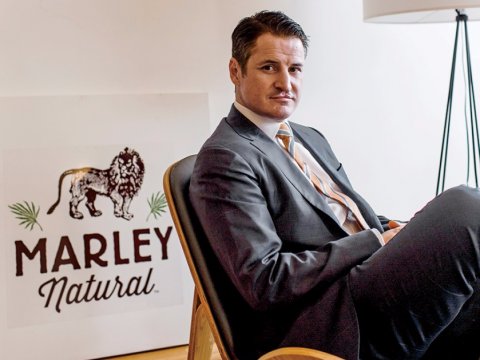Obviously, nobody reading this needs to have ‘cannabis’ explained to them, but just in case you’re wondering exactly what I mean by ‘sextech’ – sextech is technology, and technology-driven ventures, designed to enhance, innovate and disrupt in every area of human sexuality and human sexual experience.
And the cannabis and sextech industries have a whole lot in common.
1. Cannabis and sextech startups are the new unicorns
The by now overused term ‘unicorn’ refers to any tech startup that reaches a market valuation of over $1billion.
To back a unicorn is every investor’s dream. Well, you don’t get any more unicorn-friendly than cannabis and sextech.
ArcView Market Research predicts the legal cannabis market will grow by 25% this year to reach $6.7billion in total US sales, and the total could approach $22billion by 2020.
It’s a lot harder to quantify market size for sextech – especially because it’s a sector that still struggles to be officially acknowledged, one I’ve been championing for the past few years.
Also, when I say sextech, I don’t mean porn. The difference was perfectly articulated by Jon Evans writing about my social sex startup MakeLoveNotPorn in Techcrunch last year:
The internet – and the tech industry as a whole – has essentially polarized into two separate, independent fiefdoms: porn, and non-sexual content. There is little to no room for anything in between
MakeLoveNotPorn is sexual content that isn’t porn, and is part of the huge, huge sextech market in the ‘in between’.
In the absence of official quantification, let’s put it this way: A 2004 study found that 1% of the world’s population can be defined as asexual.
As my friend Stoya said when she shared this statistic with me: “My gosh, what a gloriously large potential market that leaves.”
Sex as the universal human use case makes for many, many unicorns.

‘To back a unicorn is every investor’s dream [and] you don’t get any more unicorn-friendly than cannabis and sextech’ The Maiden and the Unicorn by Domenichino, 1602. (Source: Wikimedia Commons – © Alinari Archives/CORBIS)
Legalization of cannabis is progressing across the US, subject to the same stringency as legislation around any venture that involves sex in any form.
What this means is that today’s cannabis and sextech startups are particularly concerned to ensure that they operate entirely within the letter of the law.
An extremely substantial part of MakeLoveNotPorn‘s seed funding went on legal fees to make sure of that. Investors need have no worry on that score.
3. Cannabis and sextech fight a battle every day that other startups don’t
Nevertheless, despite that legality, cannabis and sextech startups share very similar obstacles. Every single piece of business infrastructure other startups can take for granted, we can’t at MLNP, because the small print always says ‘No adult content’. We can’t get funded, banked, put mainstream payment processing in place, and cannabis startups face the same issues.
But here’s the good news: every obstacle we face is a huge disruptive business opportunity in itself. Be that investor/bank/payment processor/business service dedicated to working with the future of cannabis and sextech, and build your own unicorn.
And what those battles mean is….
4. Cannabis and sextech founders are the ones to back, because we’re forged in fire
Investors talk about the importance of backing people, not ideas.
Tad Friend wrote in his May 2015 profile of Marc Andreessen in the New Yorker:
The game in Silicon Valley is not ferocious intelligence or a contrarian investment thesis; everyone has that..It’s prescience. And then it’s removing every obstacle to the ferocious clarity of your vision: incumbents, regulations, folkways, people. Can you not just see the future, but summon it?
Every one of us working in cannabis and sextech has to not just see the future but summon it – remove every obstacle to the clarity of our vision ourselves.
We’re the founders to bet on, because we’ve been to hell and back and kept right on going. It’s a very good thing that what most motivates me is the dynamic best articulated as, “I’m going to fucking well show you.”
5. The most disruptive takes on cannabis and sextech are coming from female founders
It’s unsurprising that many of the most innovative, disruptive ventures in both cannabis and sextech are from female founders. Women challenge the status quo because we are never it. The cannabis industry has women like Ah Warner and her all-female staff at Cannabis Basics; Jane West of WomenGrow, creating more female cannabis entrepreneurs; and Olivia Chong of StockpotImages helping cannabis marketing to break down stereotypes.
In sextech, women are owning our sexuality and coming up with female-founded concepts that have tremendous appeal for both women and men, whether they’re Ti Chang’s beautiful Crave vibrators, Tina Gong’s HappyPlaytime app that destigmatizes female masturbation while providing much-needed help for straight men, or Janet Lieberman and Alex Fine’s Dame Products Eva, designed to ensure women can orgasm during sex as frequently as men.
6. Investor hypocrisy towards cannabis and sextech goes against their own best interests
It’s a general investment precept that you should invest in the things you love doing/buying, that you’re passionate about, that you spend a lot of time on.
Ahem.
What less visionary investors are also failing to see is, as Tristan Pollock says in his post on what he calls ‘vicetech’
Historically, and inevitably, everything moves towards liberalization. That means that humans tend to become more accepting over time
The huge returns to be made come not from cannabis and sex per se, but from the normalisation and socialisation of both.
So what could the future look like?
Well, I’m a big fan of the Privateer model – because Privateer gets it. And as someone whose background is 30 years working in marketing, advertising and brandbuilding, I love that they understand the power of building brands.
Privateer Holding describes itself as ‘a pioneering company of firsts’. It currently comprises three cannabis brands: Leafly, ‘the world’s cannabis information resource’; Tilray, ‘exceptional medical cannabis’; and Marley Natural, ‘the official Bob Marley cannabis brand’.
In April 2015, Privateer CEO and co-founder Brendan Kennedy told Techcrunch
We’re in this really interesting stage at the end of prohibition. Our focus is on creating brands that fuel change, that change perceptions of the product and user – brands that inspire trust, and brands that create legitimacy.
In an interview with VolteFace in March, Kennedy said
We raised $7 million in our first round, $75 million in the second round and I think we’ll raise an additional $100 million this year. It’s mostly from high net worth individuals and institutional investors. There is a sense of the inevitability of cannabis becoming legal. There’s a fear of missing out on an investment opportunity. So they look for potential targets for investment and they end up with us. I don’t make that statement out of ego. There just aren’t a lot of opportunities.
This is Privateer Holdings’ mission statement on their website:
Founded in 2010 in Seattle by three visionary entrepreneurs with decades of experience in investment banking and venture capital, we represent a group of investors from around the world seeking to end cannabis prohibition and the social harms it causes. Through a combination of acquisitions, investments and incubation, we are focused on building a portfolio of global brands that will lead, legitimize and define the future of cannabis.
We have three fundamental beliefs:
1. Cannabis is a mainstream product consumed by mainstream people
2. The end of cannabis prohibition is inevitable
3. Brands will determine the future of the cannabis industry.
In an industry stigmatized by negative perceptions and substandard business practices, we are elevating consumer expectations through consistent quality and service. When prohibition ends, we intend to hold the most enviable position in the market and to generate enormous returns – both financial and social
We need the Privateer of sextech
Imagine:
Founded in 2016 in ______ by _________ with decades of experience in ______________, we represent a group of investors from around the world seeking to end shame and embarrassment around sex and the social harms it causes. Through a combination of acquisitions, investments and incubation, we are focused on building a portfolio of global brands that will lead, legitimize and define the future of sextech.
We have three fundamental beliefs
1. Sex is a universal human experience which can be made more enjoyable for everyone on the planet
2. The end of embarrassment around sex is inevitable
3. Trusted brands will determine the future of sextech
In an industry stigmatized by negative perceptions and substandard business practices, we are elevating consumer expectations through consistent quality and service. We intend to make embarrassment end, and when it does, we intend to hold the most enviable position in the market and to generate enormous returns – both financial and social
What might the Privateer Holdings of sextech look like?
Well, obviously I’m biased, but it would of course house MLNP – which we designed to be the global go-to #realworldsex platform and foundational hub for an entire collaborative ecosystem of related and relevant sexual health, education and well-being products and services.
Add, as referenced above, Crave, Happy Playtime and DameProducts, and yes, what you begin building is a female-founder, female-vision-driven brand portfolio that would not only prove that there is a huge amount of money to be made out of taking women seriously, especially in this area, but also that doing so scales products and experiences that will make a huge amount of men very happy.
As a sextech entrepreneur, I monitor developments in the cannabis industry closely, because I find the parallels I’ve cited above so fascinating. Cannabis and sextech do make great bedfellows – heh heh, in every sense of the word – and I can’t wait to see where the pioneers in both industries take us. It’s one hell of a ride, with, when we have achieved the social acceptability and shareability we’re working towards, one hell of a reward.
Cindy Gallop is the founder and CEO of MakeLoveNotPorn
She’d love to talk to anyone who likes the sound of the Privateer Holdings of sextech: cindy@makelovenotporn.com




